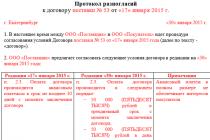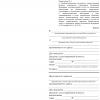Operational shooting frame
An on-site tax audit is a concern not only for the company's management and its accounting department, but also for lawyers who play an important role in this. The experts told how to determine the risk of conducting an audit, why it is necessary to collect evidence of prudence when choosing a counterparty in advance, and what methods of pressure - legal and not so used by the tax during interrogations. Their procedure is not regulated in as much detail as in the criminal process, but interrogated people have rights that must be remembered. You will also find out what violations can be a reason to cancel additional charges.
1. How does the tax inspection work on field tax audits?
AT last years check less and charge more and more. According to the Federal Tax Service, the number of field tax audits in 2016 decreased by 15%, and as a result, the budget received 173 billion rubles, which is 21% more than in 2015. We managed to achieve such results, among other things, thanks to a preliminary analysis: companies with the largest possible amount of real additional charges fall into the field inspection plan. And before leaving for an inspection (this is not a cheap pleasure for the budget), the taxpayer may be offered to pay extra "peace"
In total, almost 770 billion rubles were forcibly collected to the budgets of all levels in 2016. - this is 14% more than in 2015, reported Deputy Head of the Federal Tax Service Daniil Egorov. The agency is increasingly protecting the rights of the budget in courts: in 2017, cases were resolved in its favor for 82% of all additional charges, reported Deputy Head of the Federal Tax Service Sergey Arakelov. Moreover, if we take the number of cases, it turns out that the Federal Tax Service won about half, clarifies lawyer of tax and legal consulting department in Russia and the CIS Alexander Grinko. How more amount claims in a case, the harder the inspectors try, he explains. On the one hand, the tax authorities began to work better, admits Galina Akchurina, partner , Director of Tax Disputes Department. But, on the other hand, she continues, judicial control over officials has become less thorough. Courts often turn a blind eye to flaws in their evidence, Akchurina says.
2. How to determine the risk of conducting an on-site inspection?
The risk can be assessed independently on the basis of criteria developed by the Federal Tax Service. For example, she considers it suspicious when a firm pays less taxes on average than its competitors in the same field, reports losses over several periods in a row, has significant tax deductions and so on (v. 4). At the same time, the tax authority assesses the possibility or fact of obtaining an unreasonable tax benefit, specified in the order.
However, the approaches outlined in it are basic, and there may be other reasons for checking now - for example, the tax authority saw a scheme for “splitting up” a business, shares advocate tax practice Semyon Dergachev. An expanded requirement to provide documents for periods that were not previously verified can serve as a harbinger of verification, adds Grinko. It is also necessary to keep an eye on counterparties - whether one of them fell into the field of view of the IFTS as unscrupulous.
3. What can be done before the audit to make it successful?
Of course, you need to keep documentation in accordance with the law on accounting and the requirements of other regulations. Special attention should be given to papers that are associated with tax benefits, because this is one of the grounds for a tax audit, recalls bureau managing partner Roman Terekhin. He advises to collect evidence of due diligence in advance when choosing a counterparty, because "neither the tax authorities nor the court will take their word for it later." Terekhin recommends saving the pages of contractors' websites and their commercial offers, office pass logs, correspondence with officials and copies of managers' passports. “Ideally, to hold a competition to select a counterparty based on local regulations,” says Terekhin.
The company must check for itself whether it has correctly calculated the mandatory payments. The practice of tax disputes is constantly changing, and the pro-budgetary approach prevails in the courts, warns Akchurina. If you correct your mistakes before checking and submit updated declarations, this will help you avoid fines (from 20% to 40% of the unpaid amount) and additional penalties, says Akchurina. She draws attention to the fact that from October 1, 2017, the amount of the penalty increases. If the tax payment is delayed by more than 30 days, it will amount not to 1/300, but to 1/150 of the refinancing rate (clause 4, article 75 of the Tax Code).
4. How to behave correctly when exchanging documents with tax authorities?
You must act strictly according to the law. It is necessary to require the inspectors to draw up all requests on paper, and in the answers to indicate in detail the list of applications, says Terekhin. The inventories will prove that documents do not need to be resubmitted - even as part of other events, Akchurina notes. Terekhin also recommends fixing violations of the terms of the check - so that there is something to refer to if the time for collecting the arrears expires.
According to Dergachev, tax authorities may request documents that are very remotely related to the calculation of taxes, for example, copies work books or time sheets. Here Dergachev advises trying to find out why such papers are needed and building a position based on the answer. In addition, the inspectorate may require that the taxpayer himself draw up registers or tables of information in a form that is convenient for officials. But they have no right to shift their work to others, emphasizes Dergachev.
It happens that the tax authority requires a large amount of documents that cannot be provided within 10 days. Then it is necessary on the same day when the request is received (or the next one) to send a reasoned application for an extension of the deadlines, recommends Akchurina. According to her, this will make it possible to challenge the punishment under Art. 126 NK for late provision documents.
5. How are tax interrogations carried out and what rights do those interrogated have?
A significant number of claims are now based precisely on the testimony of witnesses, says Akchurina. According to her, not only the head or chief accountant can be interrogated, but also the drivers of officials, employees who sign for the acceptance of documents, technical staff, and so on. Tax officials now often go home for interrogation or to the dacha of an employee (often accompanied by law enforcement officers), says the FBK lawyer. In this case, according to her, it is possible to demand an official summons by subpoena. Interrogation in such an "informal" setting is a kind of psychological pressure on a person who can sign the proposed papers without reading them, Akchurina warns.
It is desirable that a lawyer accompany the employee during interrogation (especially if an employee of the “economic” police (OEBiPK) is involved in the event. Some tax authorities allow only lawyers, because the Tax Code, unlike the Code of Criminal Procedure, does not clearly regulate the interrogation of witnesses, Dergachev notes. In any case the presence of a qualified lawyer usually brings the tax authorities to reason, who often go beyond what is permitted in a conversation, several experts admit this at once.
Testimony should only be actual circumstances. Grinko shares some general advice:
It is better to answer approximately, without perfect accuracy, to open questions without details, emphasizing the business goal for the company;
In response to questions about specific transactions, you can refer to the texts of contracts and primary documents;
Do not tell more than should be known by virtue of the position (even if the tax inspector has his own understanding of official duties);
If the interrogated person does not know or is not sure, do not be shy to say so.
Akchurina recalls that the taxpayer himself, within the framework of the audit, can take an active position: apply for the summons of those persons who can speak out in his defense. If officials evade their summons, the company itself can initiate an interrogation as part of the procedure for securing evidence from a notary, Akchurina suggests. It is necessary to invite representatives of the tax authorities there, she says.
6. What violations are often encountered during interrogations?
According to Dergachev, officials often try to ask "compromising" questions: "Are you a nominee director?", "Do you consider yourself a conscientious taxpayer?" But, according to him, such provocations are illegal: they are based on a subjective assessment of "nominality" and "good faith", while testimony is given only on the facts. As Terekhin adds, inspectors do not have the right to demand handwriting samples from witnesses. Threats with a "punishment" should not be taken seriously - it's just a way of pressure, Akchurina believes. Art. 128 tax code punishes failure to appear for interrogation on an official summons with a fine of 1,000 rubles, and unlawful refusal to testify or giving false testimony - 3,000 rubles.
Unlike obtaining explanations, interrogation involves fixing questions asked and answers. If the questions are not clearly written, and the testimony is presented freely, this often allows the essence of the testimony to be distorted and freely interpreted, Akchurina warns. She advises to follow how the words of the witness are reflected in the protocol, if necessary, bring comments on it and even, on their own initiative, supplement with those circumstances that may be useful for the defense.
7. What violations are serious enough to invalidate the test result?
If the taxpayer was not allowed to participate in the process of reviewing the audit materials personally or through a representative, this is a reason to cancel additional charges. The same applies to the situation when the person being checked was not given the opportunity to provide explanations, says paragraph 14 of Art. 101 of the Tax Code. The article includes in the list of significant shortcomings and others that "led or could lead to the adoption of the wrong decision", for example, improper notification. But the tax authorities rarely make frankly gross miscalculations now, several lawyers admit at once.
Terekhin continues the list of violations:
- it is unacceptable when the amount of additionally assessed tax in the decision exceeds the figure in the inspection report or the violation in the decision has been significantly reclassified;
- an additional charge may be declared illegal if the main evidence for it is papers obtained in violation of the law (for example, expert opinions obtained without the knowledge of the taxpayer, or documents from law enforcement officers that do not meet the requirements of the law "On Investigative Activities").
Grinko advises to always check the calculations in the check report. “Often they may contain errors, even if it is indicated that the calculations are based on accounting or tax registers provided by the company,” Grinko explains. When filing objections, the figures should be commented in detail, the lawyer advises.
And the inspection has always been and will continue. In resolving these conflicts, the parties should be guided by both the provisions tax legislation and the rules of the Arbitration Procedure Code.
Thus, the Federal Law of July 2, 2013 No. 153-FZ introduced a mandatory procedure for pre-trial appeal of almost all non-normative acts of tax authorities, as well as their actions (inaction) that, in the opinion of the taxpayer, infringe or violate his rights. From this rule the following exceptions exist:
- non-normative acts as well as actions (inaction) of its officials can be appealed only in court;
- non-normative acts adopted as a result of the consideration of complaints (appeals), at the choice of the taxpayer, can be appealed to a higher tax authority or in court.
But even if there is given order Not all tax disputes can be resolved amicably. Many unsettled items go to arbitrators. The initiator of the appeal to the court can be both the taxpayer and the inspection.
Arguers at any stage of the process or in execution judgment may resort to conciliation procedures, the most of which is the conclusion of a settlement agreement.
Litigation, regardless of the reason for the dispute (for example, on the recovery of arrears), always takes a lot of effort and time, and also brings significant financial costs. Arbitrators, before making a decision, must study all the documents submitted to the case file, correlate their content with the provisions of the law, and, if necessary, appoint various examinations (for example, handwriting). And even the issued decision does not indicate that the disagreements have been resolved, since the party to the dispute that does not agree with the decision has the right to appeal it.
In this regard, the parties participating in the proceedings are given the opportunity by law to resolve the disputed issue on their own. So, disputants at any stage of the arbitration process or in the execution of a court decision can resort to conciliation procedures, the most common of which is the conclusion of a settlement agreement. It can be concluded in any case (for example, bankruptcy), unless otherwise provided by the provisions of the Arbitration Procedure Code and other federal law. When considering a tax dispute, this procedure was used extremely rarely, since it was still not clear whether the tax authority had the right to conclude such agreements. However, today the Federal Tax Service has clarified that the conclusion of a settlement agreement between the tax and the taxpayer is possible (letter of the Federal Tax Service of Russia dated October 2, 2013 No. SA-4-7 / 17648).
Bargaining is appropriate
The tax is obliged to comply with the requirements of the law, as well as to guard the interests of the state. Accordingly, the inspectorate will never agree to make concessions that are contrary to tax laws. However, some issues can still be compromised.
Firstly, the tax authority may agree to provide a deferral (installment plan) for In this case, the taxpayer will most likely have to pay all existing arrears, penalties and fines, since the deferral condition in itself will already be a big concession from the Federal Tax Service.
Secondly, to agree on a reduction in the amount of penalties, or rather, on a reduction in the period for which they will be charged. The Inspectorate is unlikely to refuse a full non-calculation of penalties if the taxpayer has a delay in paying taxes. However, you can come, for example, to the following dispute resolution option: the taxpayer undertakes to pay all tax debts, and the inspectorate, in turn, accrues penalties only for the period from the date of the decision on the results of the audit until the moment the claims are sent to the arbitration court.
Thirdly, to agree on a reduction in the fine. The tax legislation provides for the possibility of reducing the amount of the fine by at least two times compared to the amount, which for various tax offenses. At the same time, attention should be paid to the fact that the tax authority, having established mitigating circumstances, almost always reduces the fine only by half, but no more (for more details, see the article “Let's Mitigate Circumstances” in the journal “Practical Accounting” No. 2, 2013).
Mitigating grounds include the following (Article 112 of the Tax Code of the Russian Federation):
- personal (family) circumstances;
- the presence of a threat or coercion (due to material, service or other dependence);
- the difficult financial situation of an individual involved in the tax
This list is not closed, therefore, other circumstances may be attributed to the grounds that can help reduce the amount of the fine.
So, you can refer to the following circumstances: self-identification and correction of errors in the declaration; payment of tax and during the period of the audit; the offense did not result in any negative consequences; the difficult situation of the organization, etc. You can also try to negotiate a reduction in the fine by more than half. The tax legislation does not contain provisions that clearly regulate how many times the fine can be reduced.
Thus, there are many options for what you can agree with the inspection. The main thing is that the dialogue should be constructive, and there should be mutual understanding and a desire to find a compromise.
The procedure for concluding a "world"
A settlement agreement is a document that contains the conditions for reconciliation of the parties and termination of the dispute. The initiator of the conclusion of the agreement can be both the taxpayer and the tax authority.
Having decided to conclude an agreement, the parties discuss all the conditions that will be included in it, as well as the concessions that they are ready to make. At the same time, its provisions should not violate the rights and legitimate interests of other persons and be contrary to the law.
At the conclusion of the "world" in tax dispute the order of approval is different from the generally established one. Thus, the draft agreement is first sent to the Legal Department of the Federal Tax Service of Russia for approval, and only after it is received is submitted for approval by the court. In the absence of agreement, agreements are not concluded.
After agreeing on all issues, the parties draw up an agreement in which, in without fail information is indicated on the conditions, on the amount and on the timing of the fulfillment of obligations to each other or one party to the other. It may also include the following conditions:
- on the postponement or installment plan for the fulfillment of obligations by the defendant;
- on assignment of rights of claim;
- on full or partial forgiveness or recognition of debt;
- on the distribution of court costs, etc.
So, the draft agreement must first be sent to the Legal Department of the Federal Tax Service of Russia for approval. In the absence of agreement, amicable agreements are not concluded.
If the agreement is agreed upon, then at the next court session it is necessary to file a petition for approval of the settlement agreement and submit to the court its text, signed by the taxpayer (his representative) and the tax authority.
The settlement agreement is drawn up and signed for each party concluding it, as well as one more copy for the court. After the court approves the settlement agreement, an additional copy is attached to the case file.
The court, after receiving the signed version of the document, checks whether it violates the rights of other persons and whether it complies with the law. In the absence of contradictions, the agreement is approved, and the court fixes the agreements reached.
In the case when a settlement agreement is concluded in the process of execution of a court decision, it must be submitted for approval to the arbitration court of first instance at the place of execution of the judicial act or to the court that issued the decision.
Since the settlement agreement is a direct reflection of the agreement of the parties, then its execution must take place voluntarily, as well as within the terms and on the conditions that are provided for in it. If the agreement is not performed voluntarily, then the injured party has the right to demand enforcement of the agreement. In this case, an application for extradition is filed with the court. writ of execution on the basis of which the agreement is enforceable.
The settlement agreement cannot be terminated or invalidated. Re-examination of the case between the same parties and on the same grounds after the conclusion of the "amicable" is not allowed.
I.D. Shilov, for the magazine "Practical Accounting"
Policy regarding the processing of personal data
1. Terms and accepted abbreviations
1. Personal data (PD) - any information relating to a directly or indirectly identified or identifiable natural person (PD subject).
2. Processing of personal data - any action (operation) or a set of actions (operations) performed using automation tools or without using such tools with personal data, including collection, recording, systematization, accumulation, storage, clarification (updating, changing), extraction, use, transfer (distribution, provision, access), depersonalization, blocking, deletion, destruction of personal data.
3. Automated processing of personal data - processing of personal data using computer technology.
4. Personal data information system (PDIS) - a set of personal data contained in databases and providing their processing information technologies and technical means.
5. Personal data made public by the subject of personal data - PD, access to which is provided to an unlimited number of persons by the subject of personal data or at his request.
6. Blocking of personal data - temporary suspension of the processing of personal data (except when processing is necessary to clarify personal data).
7. Destruction of personal data - actions, as a result of which it becomes impossible to restore the content of personal data in the information system of personal data and (or) as a result of which material carriers of personal data are destroyed.
8. A cookie is a piece of data that is automatically placed on your computer's hard drive each time you visit a website. Thus, a cookie is a unique browser identifier for a website. Cookies make it possible to store information on the server and help you navigate the web more easily, as well as allow you to analyze the site and evaluate the results. Most web browsers allow cookies, but you can change your settings to refuse cookies or track their path. At the same time, some resources may not work correctly if cookies are disabled in the browser.
9. Web marks. On certain web pages or emails, the Operator may use "web tagging" technology common on the Internet (also known as "tags" or "precise GIF technology"). Web tagging helps you analyze the performance of websites, for example by measuring the number of visitors to a site or the number of "clicks" made on key positions on a site page.
10. Operator - an organization that independently or jointly with other persons organizes and (or) carries out the processing of personal data, as well as determines the purposes of processing personal data, the composition of personal data to be processed, actions (operations) performed with personal data.
11. User - Internet user.
12. The site is a web resource https://lc-dv.ru, owned by the Company with limited liability"Legal Center"
2. General provisions
1. This Policy regarding the processing of personal data (hereinafter referred to as the Policy) is drawn up in accordance with paragraph 2 of Article 18.1 of the Federal Law "On Personal Data" No. 152-FZ of July 27, 2006, as well as other regulatory legal acts Russian Federation in the field of protection and processing of personal data and applies to all personal data that the Operator can receive from the User during his use of the Site on the Internet.
2. The operator ensures the protection of processed personal data from unauthorized access and disclosure, misuse or loss in accordance with the requirements of the Federal Law of July 27, 2006 No. 152-FZ "On Personal Data".
3. The Operator has the right to make changes to this Policy. When changes are made, the heading of the Policy indicates the date of the last revision of the revision. The new version of the Policy comes into force from the moment it is posted on the website, unless otherwise provided new edition Politicians.
3. Principles of personal data processing
1. The processing of personal data by the Operator is carried out on the basis of the following principles:
2. legality and fair basis;
3. limiting the processing of personal data to the achievement of specific, predetermined and legitimate purposes;
4. preventing the processing of personal data that is incompatible with the purposes of collecting personal data;
5. preventing the merging of databases containing personal data, the processing of which is carried out for purposes incompatible with each other;
6. processing only those personal data that meet the purposes of their processing;
7. compliance of the content and scope of the processed personal data with the stated purposes of processing;
8. preventing the processing of personal data that is excessive in relation to the stated purposes of their processing;
9. ensuring the accuracy, sufficiency and relevance of personal data in relation to the purposes of processing personal data;
10. destruction or depersonalization of personal data upon reaching the goals of their processing or in case of loss of the need to achieve these goals, if it is impossible for the Operator to eliminate the committed violations of personal data, unless otherwise provided by federal law.
4. Processing of personal data
1. Obtaining PD.
1. All PD should be obtained from the PD subject himself. If the subject's PD can only be obtained from a third party, then the subject must be notified of this or consent must be obtained from him.
2. The operator must inform the PD subject about the purposes, alleged sources and methods of obtaining PD, the nature of the PD to be received, the list of actions with PD, the period during which the consent is valid and the procedure for its withdrawal, as well as the consequences of the refusal of the PD subject to give written consent to receive them.
3. Documents containing PD are created by receiving PD over the Internet from the PD subject while using the Site.
2. The operator processes PD if at least one of the following conditions exists:
1. The processing of personal data is carried out with the consent of the subject of personal data to the processing of his personal data;
2. The processing of personal data is necessary to achieve the goals provided for by an international treaty of the Russian Federation or the law, for the implementation and fulfillment of the functions, powers and obligations assigned by the legislation of the Russian Federation to the operator;
3. The processing of personal data is necessary for the administration of justice, the execution of a judicial act, an act of another body or official subject to execution in accordance with the legislation of the Russian Federation on enforcement proceedings;
4. The processing of personal data is necessary for the performance of an agreement to which the subject of personal data is a party or beneficiary or guarantor, as well as to conclude an agreement on the initiative of the subject of personal data or an agreement under which the subject of personal data will be the beneficiary or guarantor;
5. The processing of personal data is necessary to exercise the rights and legitimate interests of the operator or third parties, or to achieve socially significant goals, provided that the rights and freedoms of the subject of personal data are not violated;
6. Processing of personal data is carried out, access of an unlimited number of persons to which is provided by the subject of personal data or at his request (hereinafter - publicly available personal data);
7. Processing of personal data subject to publication or mandatory disclosure in accordance with federal law is carried out.
3. The Operator may process PD for the following purposes:
1. raising awareness of the PD subject about the products and services of the Operator;
2. conclusion of agreements with the subject of PD and their execution;
3. informing the PD subject about the news and offers of the Operator;
4. identification of the subject of PD on the Site;
5. ensuring compliance with laws and other regulatory legal acts in the field of personal data.
1. Individuals who are in civil law relations with the Operator;
2. Individuals who are Users of the Site;
5. PD processed by the Operator - data received from Users of the Site.
6. Processing of personal data is carried out:
1. - using automation tools;
2. - without the use of automation tools.
7. Storage of PD.
1. PD of subjects can be received, further processed and transferred for storage both on paper and in electronic form.
2. PD recorded on paper are stored in locked cabinets or in locked rooms with limited access rights.
3. PD of subjects processed using automation tools for different purposes is stored in different folders.
4. It is not allowed to store and place documents containing PD in open electronic catalogs(file sharing) in ISPD.
5. Storage of PD in a form that allows to identify the subject of PD is carried out no longer than required by the purposes of their processing, and they are subject to destruction upon achievement of the purposes of processing or in case of loss of the need to achieve them.
8. Destruction of PD.
1. Destruction of documents (carriers) containing PD is carried out by burning, crushing (grinding), chemical decomposition, transformation into a shapeless mass or powder. A shredder may be used to destroy paper documents.
2. PD on electronic media are destroyed by erasing or formatting the media.
3. The fact of the destruction of PD is documented by an act on the destruction of media.
9. Transfer of PD.
1. The operator transfers PD to third parties in the following cases:
- the subject has expressed his consent to such actions;
- the transfer is provided for by Russian or other applicable legislation within the framework of the procedure established by law.
2. List of persons to whom PD is transferred.
Third parties to whom PD is transferred:
The operator transfers the PD to Legal Center LLC (which is located at the address: Khabarovsk, 680020, Gamarnika St., 72, office 301) for the purposes specified in clause 4.3 of this policy. The operator entrusts the processing of PD to Legal Center LLC with the consent of the PD subject, unless otherwise provided by federal law, on the basis of an agreement concluded with these persons. Legal Center LLC carries out the processing of personal data on behalf of the Operator, they are obliged to comply with the principles and rules for the processing of personal data provided for by Federal Law-152.
5. Protection of personal data
1. According to requirements normative documents The operator has created a personal data protection system (PDPS), consisting of subsystems of legal, organizational and technical protection.
2. The subsystem of legal protection is a complex of legal, organizational, administrative and regulatory documents that ensure the creation, operation and improvement of the CPAP.
3. The subsystem of organizational protection includes the organization of the management structure of the SPD, the permit system, the protection of information when working with employees, partners and third parties.
4. The technical protection subsystem includes a set of technical, software, software and hardware tools that ensure the protection of PD.
5. The main PD protection measures used by the Operator are:
1. Appointment of a person responsible for the processing of PD, who organizes the processing of PD, training and instruction, internal control over compliance by the institution and its employees with the requirements for the protection of PD.
2. Determination of actual threats to the security of PD during their processing in ISPD and development of measures and measures to protect PD.
3. Development of a policy regarding the processing of personal data.
4. Establishment of rules for access to PD processed in ISPD, as well as ensuring registration and accounting of all actions performed with PD in ISPD.
5. Establishment of individual access passwords for employees in information system according to their job responsibilities.
6. The use of information security tools that have passed in in due course conformity assessment procedure.
7. Certified anti-virus software with regularly updated databases.
8. Compliance with the conditions that ensure the safety of PD and exclude unauthorized access to them.
9. Detection of facts of unauthorized access to personal data and taking action.
10. Recovery of PD modified or destroyed due to unauthorized access to them.
11. Training of the Operator's employees directly involved in the processing of personal data on the provisions of the legislation of the Russian Federation on personal data, including the requirements for the protection of personal data, documents defining the Operator's policy regarding the processing of personal data, local acts on the processing of personal data.
12. Implementation internal control and audit.
6. Basic rights of the subject of PD and obligations of the Operator
1. Basic rights of the subject of PD.
The subject has the right to access his personal data and the following information:
1. confirmation of the fact of PD processing by the Operator;
2. legal grounds and purposes of PD processing;
3. purposes and methods of PD processing used by the Operator;
4. name and location of the Operator, information about persons (excluding employees of the Operator) who have access to PD or to whom PD may be disclosed on the basis of an agreement with the Operator or on the basis of federal law;
5. terms of personal data processing, including the terms of their storage;
6. the procedure for the exercise by the PD subject of the rights provided for by this Federal Law;
7. name or surname, first name, patronymic and address of the person processing PD on behalf of the Operator, if the processing is or will be entrusted to such a person;
8. contacting the Operator and sending him requests;
9. appeal against the actions or inaction of the Operator.
10. The user of the Site may at any time revoke his consent to the processing of PD by sending an email to the email address: [email protected], or by sending a written notice to the address: 680020, Khabarovsk, st. Gamarnika, house 72, office 301
eleven. . Upon receipt of such a message, the processing of the User's PD will be terminated, and his PD will be deleted, except in cases where the processing can be continued in accordance with the law.
12. Obligations of the Operator.
The operator is obliged:
1. when collecting PD, provide information on the processing of PD;
2. in cases where the PD was not received from the subject of the PD, notify the subject;
3. if the subject refuses to provide PD, the consequences of such refusal are explained to the subject;
5. take the necessary legal, organizational and technical measures or ensure their adoption to protect PD from unauthorized or accidental access to them, destruction, modification, blocking, copying, provision, distribution of PD, as well as from other illegal actions in relation to PD;
6. respond to requests and appeals of PD subjects, their representatives and the authorized body for the protection of the rights of PD subjects.
7. Features of the processing and protection of data collected using the Internet
1. There are two main ways in which the Operator receives data using the Internet:
1. Provision of PD by PD subjects by filling out forms on the Site;
2. Automatically collected information.
The operator may collect and process information that is not PD:
3. information about the interests of Users on the Site based on the entered search queries users of the Site about services and goods sold and offered for sale in order to provide up-to-date information to Users when using the Site, as well as to summarize and analyze information about which sections of the Site, services, goods are most in demand among Users of the Site;
4. processing and storage of search queries of the Site Users in order to summarize and create statistics on the use of sections of the Site.
2. The Operator automatically receives certain types of information obtained in the course of Users' interaction with the Site, e-mail correspondence, etc. We are talking about technologies and services such as cookies, Web marks, as well as applications and tools of the User.
3. At the same time, Web marks, cookies and other monitoring technologies do not make it possible to automatically receive PD. If the Site User, at his own discretion, provides his PD, for example, when filling out a feedback form, then only then will the processes of automatic collection of detailed information start for the convenience of using the Site and / or to improve interaction with Users.
8. Final provisions
1. This Policy is local normative act Operator.
2. This Policy is public. The general availability of this Policy is ensured by publication on the Operator's Website.
3. This Policy may be revised in any of the following cases:
1. when changing the legislation of the Russian Federation in the field of processing and protecting personal data;
2. in cases of receipt of instructions from competent government agencies to eliminate inconsistencies affecting the scope of the Policy
3. by decision of the Operator;
4. when changing the purposes and terms of PD processing;
5. when changing organizational structure, the structure of information and / or telecommunication systems (or the introduction of new ones);
6. when applying new technologies for processing and protecting PD (including transmission, storage);
7. if there is a need to change the process of processing PD related to the activities of the Operator.
4. In case of failure to comply with the provisions of this Policy, the Company and its employees are liable in accordance with the current legislation of the Russian Federation.
5. Control over the fulfillment of the requirements of this Policy is carried out by persons responsible for organizing the processing of Company Data, as well as for the security of personal data.
It used to be like: the tax authorities decided to check you and found that there was a violator in the chain of contractors and partners. It doesn't have to be your contractor, it could even be a contractor's contractor or even the fifth link in the chain. You might not even know this company and have nothing to do with it. And so they underpaid something, but they asked you.
The IRS simply added an unreasonable tax benefit and demanded to pay extra for that guy. They, of course, collected some evidence, but did not dig deep. Some kind of examination of handwriting or a survey of employees was enough. And even if the deal was real and you honestly credited the goods or reflected the service in the costs, you could still be charged with arrears.
Several of these cases made it to the Supreme Court, and he explained to the IRS that it's not fair, guys. Now the tax authorities themselves have officially issued clarifications: how it will calculate tricky schemes, and in what cases you are not in danger.
What is an unjustified tax benefit?
Let’s say you run a business and pay taxes on notional profits. You buy and sell something, provide services or use services. The more expenses you have, the less taxes. Therefore, you try to confirm as many expenses as possible, reflect them in the accounts and declare them in declarations. It's legal if everything is done according to the rules.
Sometimes cunning entrepreneurs use gray schemes: they reflect some amount in their expenses and reduce the tax. But the counterparty did not take this amount into account in his income and did not pay taxes. The company was then abandoned, liquidated or re-registered as a figurehead. As a result, someone saved, and the budget received less taxes.
When such schemes are created on purpose and everyone in the chain is aware, it is illegal. Anyone who has saved on taxes thanks to one-night stands or dishonest suppliers has an unreasonable tax benefit. Then the tax office comes, identifies all the participants, considers how much they underpaid to the budget, and charges additional taxes.
So, everything is fair and the tax authorities are doing the right thing. What is the problem here?
The problem is that the tax authorities approached such checks formally and often punished even those who were not in the know at all and did not specifically participate in any schemes.
Imagine that you have bought a product. Here is the real one in the boxes. And here are the documents for him, with seals, as expected. And now you resell this product at a markup and pay taxes on the profits.
And then the tax office comes to you and says: you took goods from such and such a supplier, but he turned out to be a scoundrel and did not pay taxes. Are you involved in a tax avoidance scheme? We do not accept these expenses of yours or we do not accept all of them, please pay extra taxes.
The next step was to go to court. But many did not go anywhere and silently paid so as not to attract attention. Someone ran out of steam at the first instance and in the end also paid. There were those who reached the Supreme Court, proved that they were not guilty, and saved several million rubles in illegally assessed additional taxes. This usually takes several years.
We do not have precedent practice. How will court decisions on other firms help me personally?
There is no precedent practice in Russia. But this time he intervened. Supreme Court and explained such cases in the next review and explained how to act correctly, honestly and according to the law in such cases. How the tax authorities should check companies and when it is impossible to accuse the taxpayer of indiscretion and charge additional taxes to him.
The tax authorities listened to these recommendations and also published clarifications. Now the Federal Tax Service seems to be telling everyone: we will no longer check you formally and will not find fault with trifles. And you are not to blame for the fact that one of the contractors did not pay taxes. But we will look for clear evidence. Like these ones. And if we find it, it won't be good. So collect the documents so that no one finds fault with you.
This letter is Federal tax office sent it to the regional tax authorities and will demand that it be strictly executed, and that the authorities control it. Previously, there was no official position, what is due diligence and how to check counterparties so that you do not have to answer for them. Now it is.
By what rules will the tax authorities now look for unreasonable tax benefits?
There is a presumption of good faith of the taxpayer. No one can be accused without evidence of underpaying taxes or participating in a gray scheme. And out of the blue it is also impossible to force an entrepreneur to prove that he is not guilty. This tax must prove that there were violations and malicious intent. And the evidence must be clear and substantial, not formal.
It is impossible to simply conduct a handwriting examination and charge additional taxes only because of the dissimilarity of signatures on documents. A survey of the manufacturer's employees in itself is also not proof.
Here's what the IRS will check if they want to slap you unjustified benefit and add something.
Interdependence. The IRS must establish that the companies are connected or controlled by each other. Or all the participants in the chain conspired and came up with a gray scheme together.
Prudence. If there is no evidence of a connection, then discretion will be tested. For example, you bought something suspiciously expensive. Then you will be asked why you did it? Is it because they knew that this was a one-day company, and so they reduced tax base and cash out?
First link. You are responsible only for your counterparty, and not for the entire chain of suppliers or contractors. If you need to check someone just in case, then only your partner - the company that is listed in the documents.
Personal contacts. The tax office may ask where you called, with whom you negotiated and discussed the supply of goods, who provided services. They may ask if you know where your partner's office and warehouse are located. And how did you even come across it?
The tax should investigate all the circumstances, and not find fault with trifles and draw facts by the ears that do not prove anything. But this does not mean that you can issue an invoice, transfer money through a bank and not be afraid of anything. As a minimum, documents and explanations can be requested, and then they will have to be provided.
What should you do to insure yourself against claims for unreasonable tax benefits?
Get deals right. Store documents carefully and do not neglect the originals. Do not use template contracts and follow the wording. Remember: the transaction must be real, with documents and to generate income.
Check who you are working with. It is not necessary to study all the ins and outs of a partner. Can be requested free statement through a reporting system or some available service. There it will be seen that the company is operating, submits reports and pays taxes. If there are no such services, check on the tax website.
Collect information about the search for partners and agreements. It could be a website, a magazine ad, a booklet, or an email newsletter. It is advisable to fix this with prices, commercial offers or correspondence with a discussion of prices and working conditions.
Record the contacts of those with whom you communicate. Ask and keep a business card of a manager, marketer or any employee who comes to your office or sends invoices for payment. An e-mail signature will do if there is a surname and a phone number.
Check permissions. Ask for a copy of the articles of association, an appointment order, or a power of attorney to sign. Check the data with the current extract from the state register.
Prepare explanations. For example, why did you buy a product at such a price, and not cheaper. Or why they ordered so many ads, although competitors have less. And why accounting and legal services yours are so expensive. And why do you pay so much for delivery, and do not take the goods in your city, although there is a manufacturer. Make screenshots of reviews and a price comparison sign so that the level of preparation will kill the tax authorities on the spot.
The IRS was banned from accepting inconclusive evidence. But they may well find persuasive ones if you don't prepare or think it doesn't concern you.
If you think that the claims are illegal, do not rush to agree with additional charges and requirements: look for a good lawyer and go to court.
"Russian tax courier", 2015, N 4
The most intractable inspectors are sitting in the camera room.
The director's leave will give a reprieve when documents are requested.
The change in accountant will convince the inspector to reconcile.
Periodic meetings with tax inspectors cannot be avoided by any company. Most often, you have to communicate with tax authorities not for the simplest and most pleasant reasons. Such is their job - to want something and demand from taxpayers.
Unfortunately, often a conversation with inspectors is associated with missing the deadline for paying taxes or submitting documents. Or is designed to identify the cause of the tax debt. As a result, the chief accountant or director often has to rely on the high feelings of the inspector, who can "get into position" and help bring tax liabilities into line.
Together with practitioners tax experts ( list See the box below), we found out what actions the employees of the organization will have a positive impact on the relationship with the inspectors and how this will affect the tax reputation of the company.
1. The easiest way is to negotiate with the inspector
from the taxpayer department
According to the majority of surveyed experts (43%), employees of the taxpayer department are the most kind and compassionate. The specifics of the work involves daily and direct communication with representatives of companies. Accountants have to contend with nit-picking about sent letters, statements and complaints. And what discussions are unfolding on the reconciliation of calculations!
Second place and 32% of the vote went to the debt settlement department. Information about arrears and overpayments, listed in the personal accounts of the inspectorate, is often biased. Periodic shift software, "hanging" server, migration of companies by regions, manual entry of declarations, coupled with errors of the companies themselves, force "deficitors" to make demands and sometimes collect virtual debts. Maria Lisitsyna, tax expert at Consultant: IS LLC, explained that one of the ways to settle tax debts is voluntary redemption tax arrears. This means that the employees of the debt settlement department are used to the fact that they are trying to negotiate with them and solve problems peacefully.
As expected, the control block ended up at the bottom of the rankings. "Vyezdniki" won 16% of the vote and took third place. According to Nadezhda Abakumova, General Counsel for tax law chain of coffee houses "Shokoladnitsa", they are prevented from showing philanthropy by the higher management. The inspectors begin the inspection, having an unspoken specific plan - how much to charge additionally. In particular, as an employee of one of the Moscow inspectorates explained to us, a few years ago, a bar was set in Moscow for on-site tax audits in the amount of at least 1 million rubles. additional charges.
True, Denis Skryabin, managing partner of the Skryabin and Partners law firm, noted that it is most often necessary to negotiate with the field department. Since it is on the pliability of such specialists that additional taxation depends. Moreover, "travelers" often themselves offer certain options for solving the problem, if they understand that the taxpayer will be able to correct the identified error at the stage of appealing the results of the audit and the budget will still not receive the disputed amount. There are cases when the inspectors themselves offer to show the underpayment in the "clarification" and pay it voluntarily, but the disputed amount of the accrued tax is not included in the inspection report. It turned out that those who checked their plan fulfilled the identified underpayments to the budget, and the taxpayer cost "little blood."
Collaboration of department employees desk audits experts rated the lowest, giving them 9% of the vote. The cameramen have less room for maneuver - they mainly work with documents. Therefore, success awaits those companies that, for example, constantly confirm the export rate of 0% for VAT or declare benefits.
Diagram 1
2. Inspectors are women retirement age
contact taxpayers
more often than other colleagues
As the results of the survey showed, the old-timers of the inspectorate are more disposed to compromises (53%). They have many years of experience behind them and are well aware of when it is possible to indulge the taxpayer, and when it is dangerous to do so. As Sergei Ryumin, Managing Partner of INVESTAUDITRAST Consulting and Auditing Company LLC, noted, women of retirement age no longer have such ambitions and need to assert themselves as their younger colleagues. personal life chief accountant) than the reasons associated with the complexity of business processes. It is easier to find an approach to such an inspector and win over oneself by asking about children and grandchildren, pets, talking about seedlings, praising her beads, complaining about the boss, about round-the-clock work without days off, etc.
Denis Skryabin also advises trying your luck in settling tax problems in a conversation with an aged inspector. They lack the special zeal to punish and hold accountable, which is inherent in young employees who have recently begun professional activities in the tax authorities, and heads of departments. At the same time, both the boss and the young employee are often afraid to negotiate with the company, because they do not want suspicions of corruption.
29% of experts would prefer to communicate directly with heads of departments. The manager knows exactly his powers and understands what concessions he can make to the taxpayer without damage to his reputation and without loss to the budget. Dmitry Shiryaev, head of department judicial practice of the audit and consulting group "Ural Union", noted that more often it is not persuasion that leads to compromises, but persuasion. Therefore, it is easier to get what you want from a more competent employee. Usually they are middle-aged department heads. The age limit is due to the fact that a young boss may not yet know all the nuances of work, and an inspector with an old, sometimes still Soviet, approach is unlikely to meet halfway.
When entering the office of the inspector, avoid young employees who have not worked in the inspectorate for long. The blame for everything is attempts to prove oneself or fear of leadership. Natalia Mezentseva, head of department tax reporting commercial bank, explained this by the fact that young employees, as a rule, are ambitious people aimed at a career. It is not in their interests to make concessions to taxpayers. For such inspectors, any error they identify is important. After all, the more effectively they prove themselves in checking the company, the more chances they have for promotion. And the revealed indulgences to tax bearers can be regarded as attempts of bribery.
Diagram 2
3. Parsing with controllers the mistakes made in accounting,
better take a professional position
If the tax authorities have found mistakes, it is best to take the position of an experienced professional who does not understand how he could allow this to happen. And try to prove to the inspector that the mistake is a completely random misunderstanding. Practice shows that the inspector will treat such an accountant with great respect and trust and, in the absence of other violations in accounting, will believe him. This tactic is followed by 81% of the surveyed experts.
Indeed, it is always a pleasure to talk to an intelligent person - a professional in his field. It is easier for two professionals to agree and understand each other. And everyone has the right to make mistakes. Therefore, Sergei Ryumin advised the chief accountant, when talking with the inspector, not to pretend to be an inexperienced employee who makes stupid mistakes. This can only cause irritation. The mistake of a professional who, even during the conversation, will show his literacy, on the contrary, will lead to understanding.
But 19% of respondents suggest playing an inexperienced novice in front of the inspector. And not always we are talking about the lack of accounting experience. Accountants often make mistakes when switching to new software. For example, an accountant has worked in the 1C program for many years, and the SAP program has been installed at a new place of work. Natalya Shamonova, the auditor of the Finance Group LLC, noted that, according to the tax authorities, a professional accountant should not make mistakes. If, however, an error has crept in, it must be dealt with quickly. But the mistakes of young professionals are inevitable due to lack of experience. In addition, an argument in favor of a novice chief accountant will be ignorance of the nuances and specifics of the company's activities. In particular, if the accountant previously kept records trading company and now works in the construction industry.
If it becomes clear that the inspector is determined to punish the taxpayer and considers himself a professional in tax law and accounting, then it is better not to provoke him. And send a novice employee to him, who will show interest in the experience of the inspector and ask how all the shortcomings, or at least part of the errors, can be corrected without significant tax consequences.
Diagram 3
4. Presentable appearance does not always make the visitor look better
in the eyes of the inspector
The absolute majority of experts (68%) agreed that it is not necessary to flaunt expensive things and accessories. Since then it will be more difficult to convince the inspector that "the taxpayer's life is already hard, and this tax audit ...". It is enough to come in neat and comfortable clothes. Much more important is to competently build a conversation with the inspector and state your position with reason.
Natalya Shamonova reminded that inspectors are employees budget institution. And often their salary is lower than the average company's accountant's income. Therefore, it is advisable not to annoy the inspector with an expensive appearance.
True, 32% of those polled believe that it is also not worth it to show down when appearing at the inspection. Evgenia Levenets, senior auditor of 2K Audit - Business Consulting / Morison International, believes that a business suit, a briefcase and discreet make-up always win over the appearance of a "Kazan orphan", set them up in a businesslike manner and inspire respect. At the same time, this style of dress also requires a certain behavior, including from the inspector. As a result, there is a high probability of mutual respect, and not envy on the part of the inspection officer and the company's "flexion".
As Natalia Mezentseva explained, the choice appearance depends on the purpose of the visit. If you have a meeting with an ordinary inspector, it is better to dress modestly, perhaps even in casual style (jeans and a sweater). If there is a meeting with the head of the inspection, a business suit will look appropriate. Especially if the director of the company is going to talk with the head. True, gold cufflinks with zero taxes in the budget settlement card will look very suspicious. And the inspector, most likely, will be interested in what income (taxed or not) the CEO bought expensive Swiss watches.
Diagram 4
5. It will be possible to postpone the date of submission of explanations,
if the director of the company is on vacation abroad
54% of the experts agreed that the absence of the director would be considered by the inspectors as a good reason for postponing the deadline for giving clarifications or submitting documents. But such absence must be documented.
Natalya Shamonova explained that only an authorized official can sign certified copies of documents. This is either the head of the company, or his confidant. If the director is absent from the workplace (he fell ill, went on a business trip or is on vacation abroad), and there is no power of attorney for the right to sign, there is no one to certify copies of documents at the request of the inspection. In this case, the company can send a letter to the tax authorities with a request to extend the deadline for submitting documents and indicate the date by which the papers will be ready ( paragraph 3 of Art. 93 Tax Code of the Russian Federation). It is advisable to attach a copy of the order on granting leave to the director. More than half of the respondents believe that the inspectors will satisfy such a request.
A third of the respondents noted that the lack of staff in preparing copies of papers is a weighty argument for inspectors in case of failure to submit documents at the request of the inspection. You can also refer to the lack of technical capabilities for preparing copies (the copier broke, the documents are in the archive, and the archive is far away, the documents were handed over to auditors for verification, etc.). It is also better to state these arguments in writing with supporting documents attached - dismissal orders, staffing, an act of acceptance and transfer of documents to auditors.
Sergey Solovyov, a tax consultant of an audit and consulting company, shared a case from practice when the company managed not only to extend the deadlines for preparing copies of required documents, but also to reduce the amount of paperwork. The company sent calculations to the inspection, in which it showed that, taking into account the available resources (copiers, the number of employees in the accounting department, the length of the working day), it would take about six months to prepare copies of all the documents specified in the requirement.
Diagram 5
6. Social orientation of the company
induce the inspector to defer collection of the tax
until the end of reconciliation of calculations with the budget
The most powerful argument for postponing the moment of collection of arrears until the end of reconciliation, according to experts, is the social significance of the enterprise. For example, city-forming enterprises, companies that hire disabled people, provide household services to the population, medical institutions, children's leisure organizations, etc. But, according to Natalia Mezentseva, this should be a well-known fact. In addition, it would be useful for the company to confirm with documents and calculations that the payment of debts at the current moment will jeopardize the implementation of any social programs. For example, a letter of guarantee to the orphanage about the transfer Money for repairs. It should also be clarified that in the course of reconciliation of calculations, disagreements with tax authority will be settled.
A quarter of respondents believe that the inspector may be affected by the fact that the error arose through the fault of the former accountant. The inspector is not interested in recovering debts that are not actually owned by the organization. After all, the funds will have to be returned from the budget, and even with interest. Therefore, in practice, the tax authorities willingly go towards the company and shift the collection period on demand until the end of the reconciliation.
In addition, according to Natalia Shamonova, after reconciliation, an unaccounted for overpayment of taxes, penalties and fines may be revealed. This will make it possible to offset the collected tax against the resulting overpayment. Moreover, the tax authorities are well aware that arrears are often associated with inaccuracies in accounting for the database of inspectors: failures in the program, distortion of the balance, "loss" of overpayment when moving from another inspection and transferring personal accounts, arithmetic and technical errors when entering declaration data, etc.
In a conversation with the inspector, one can also refer to the difficult financial position organizations. After all, the inspector has no goal - to ruin the company. Evgenia Levenets noted that in this case, statements from the current account and accounting registers. But to appeal to the mercy of the inspector with pleas "otherwise the director will fire me" is pointless.
Nadezhda Abakumova advises not to explain the lack of funds by the insolvency of the counterparty. The inspector may think that the organization is dealing with a single buyer and suspect that it is involved in a tax avoidance scheme. It is more expedient to bring bank statements confirming that funds have not been received on the organization’s settlement accounts for a long time, so there will be nothing to collect tax from.
Diagram 6
7. Sincere surprise will not convince the inspector
extend the time to correct the error
Tax authorities have the right to independently determine whether this or that circumstance excludes the fault of the taxpayer ( pp. 4 p. 1 art. 111 Tax Code of the Russian Federation, read more on p. 12). The survey showed that the best argument would be a letter of guarantee stating that the company undertakes to correct inaccuracies in accounting and pay off the arrears in the near future (67%). Firstly, the inspector will have a document in his hands confirming that the taxpayer admits a mistake. Secondly, a document signed by the director of the company will allow the inspector to justify to the management the reasons why he extended the time to correct the error and allowed the taxpayer to avoid a fine, Denis Skryabin believes.
Read on e.rnk.ru. More useful stuff
Tax authorities do not always recognize the existence of an overpayment of taxes as a circumstance mitigating the company's liability in the event of arrears. But the organization in court manages to reduce the amount of the fine (Resolution of the Federal Antimonopoly Service of the North Caucasus dated 10/23/2013 N A32-37825/2012 , West Siberian from 10.07.2012 N A45-23284/2011 and from 03.11.2011 N A27-2692/2011 districts).
But it is not possible to reduce liability for the reason that the company has not previously committed tax offenses, even through the courts (Resolutions of the Federal Antimonopoly Service of the North-West of N А56-43173/2012 and dated 08.02.2008 N А05-6875/2007 , East Siberian from 10.07.2012 N A78-7098/2011 and Povolzhsky dated 09/13/2011 N A55-25957/2010 districts).
For more information on what arguments and mitigating circumstances will help a company reduce liability for violation of tax laws, see e.rnk.ru at article "Top 10 circumstances, referring to which companies reduce tax penalties" // RNA, 2014, N 21.
22% of experts believe that a simple promise that all errors will be eliminated is enough. Natalia Mezentseva clarified that, in addition to "word of honour", it is necessary to demonstrate to the inspector what measures the company has already taken to eliminate the error and what it plans to do to prevent them in the future. For example, drawing up an updated declaration, an order on the procedure for accounting for transactions, on strengthening control over accounting, on the appointment of a responsible employee. If the inspector is "bloodthirsty", then demonstrative "flogging" of employees will probably work - dismissal, deprivation of bonuses, etc.
Sergey Ryumin suggested A complex approach. Upon learning of the shortcomings, the director is at first sincerely surprised. This will demonstrate that the errors are unintentional and the company's management is not involved in them. Then he scolds the chief accountant and instructs to urgently fix everything. Finally, he writes a letter to the inspector, in which he sets out the essence of the misconduct, lists the measures to eliminate the misunderstanding and indicates the period during which everything will be corrected.
Diagram 7
8. The inspector is more willing to meet the general director,
than a lawyer or an accountant
Approximately half of the surveyed experts (49%) believe that inspectors would be most willing to communicate with the CEO of the company being audited. Especially at the commission on loss, when considering tax audit materials and objections, during interrogations, as well as to resolve the issue of granting tax deferrals. Usually, general director best of all in the company can explain the state of affairs in the organization and inspires more confidence in the inspector. Moreover, the request from the company, expressed by the head, automatically gives weight to the ordinary employee of the inspection in his own eyes.
According to Dmitry Shiryaev, it will be easier for the head of the enterprise to achieve indulgence. After all, being in the position of a petitioner is completely uncharacteristic behavior for him. The self-esteem of the inspector will definitely increase if a person higher in rank turns to him with a request.
Natalia Mezentseva suggested finding out more about the inspector who keeps the company's records in advance. So, if the inspector is a man, he will most likely treat with favor a young accounting employee or a general director with whom they “suddenly” have common hobbies (football, fishing, garage, etc.).
Experts gave third place to older accountants. They can “put pressure” on the inspector by persuading that errors in reporting are related to the transition to electronic accounting, which is a bit unusual to work with, and requests from the category “well, please, otherwise they will fire me, and I’m only a year or two before retirement gotta hold on."
According to experts, lawyers are not favored by inspectorates (8%). Evgenia Levenets noted that a lawyer or a nominee director, as a rule, is not particularly versed in accounting or taxation. Therefore, the inspector is more willing to meet an employee who is close to him in age, pleasant in communication and quite competent in tax matters (for example, a young employee of the financial service, if the inspector himself is young), rather than an imposing lawyer who scatters loud legal terms, but has little understanding of tax accounting. Let even the lawyer be "armed" with a bouquet of flowers and sweets. True, the option of a presentable lawyer will have the opposite effect if the inspector turns out to be a promising, ambitious young specialist seeking to build a successful career in the tax authorities. than with the head of the department
The vast majority of respondents (94%) believe that distracting the head of the inspection department on ordinary issues can even be harmful. Sergei Solovyov noted that minor issues are easier to resolve with an ordinary performer. There is no need to load the manager with technical problems - this can only cause irritation on his part, which in the future will prevent the solution of more significant tasks.
A simple executor can, for example, immediately make the necessary adjustments in the card of settlements with the budget, prepare a certificate of the status of settlements (not on the last day of the regulated period for preparing the document, but immediately upon receipt of the application), let you familiarize yourself with the draft audit report, remind you of the possibility to apply tax break. He knows his area of work better, how much time is required for certain actions. Ideally, one employee of the company can be chosen to contact the tax authorities. You have to communicate often, so he will be able to establish not only working, but also human relations with the inspectors.
Appeal to the head of the department may take longer if the head does not carry out the necessary operation on his own, but involves an employee of the department.
Maria Lisitsyna noticed that an ordinary inspectorate officer, as a rule, is less principled than his boss. Therefore, a simple question is better addressed to him. Simple executives, accustomed to working directly with taxpayers every day, will be much more willing to meet halfway than their leaders.
If the employee delays the solution of some issues and refuses to cooperate, you can use the promise "to go to the head of the department." This often helps, because many inspectors do not want the supervisor to be involved in solving issues that are within their competence. Nadezhda Abakumova, Chief Legal Counsel for Tax Law of the Shokoladnitsa chain of coffee houses; Natalia Mezentseva, head of the tax reporting department of a commercial bank; Natalia Shamonova, auditor of LLC "Group Finance";














